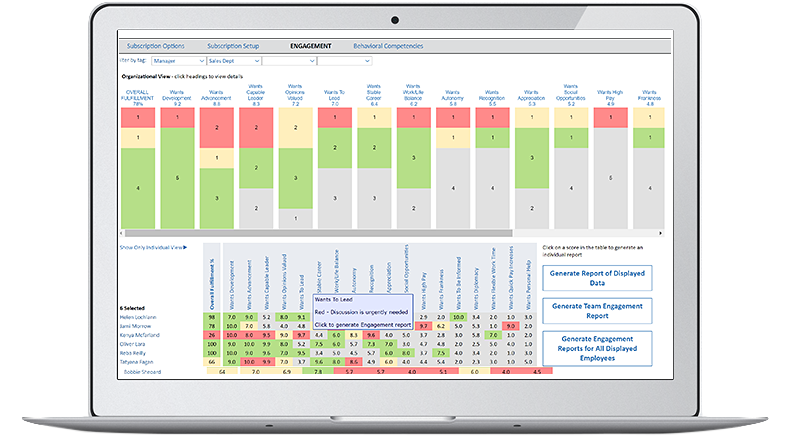A Common Language for Behavior is the Core of Organizational Culture

We've all heard Peter Drucker's famous phrase, "Culture eats strategy for breakfast." In today's competitive business environment, fostering a strong organizational culture is even more essential for long-term success. One of the most powerful but undervalued tools for cultivating this culture is the establishment of a common language for behavior. This shared language not only enhances communication but also helps align individuals and teams with the values and objectives of the organization.
What is a Common Language for Behavior?
A common language for behavior refers to the consistent use of terms and definitions to describe specific actions, tendencies, and reactions of individuals in the workplace. These behaviors could include traits such as taking Initiative, collaboration, enforcing standards, openness, optimism, and analyzing potential problems. Having a shared vocabulary allows for clearer, more productive conversations about performance and growth.
The Advantage of Nuanced Behavioral Data
Traditional personality assessments often group people into broad categories (e.g., introvert vs. extrovert). While useful, these tools provide only a general overview of an individual's behavior. In contrast, Harrison Assessments goes much further. It measures 175 distinct workplace traits, offering detailed data that provides a comprehensive understanding of both positive and negative behaviors.
This rich data helps organizations move beyond labels and generalizations, providing a more accurate picture of each employee's motivations, how they engage with others, and where they may need further support. As a result, conversations around performance and development are far more nuanced and actionable.
How a Common Language for Behavior Enhances Organizational Culture
1. Aligning Organizational Values with Employee Behavior
Every organization has core values that form the foundation of its culture-whether teamwork, integrity, or innovation. These values should be reflected in the daily behavior of employees. A common language for behavior ensures that organizational values aren't just abstract ideas-they become embedded in how employees act and interact.

By using tools like Harrison Assessments, organizations can measure specific behavioral preferences, ensuring that employee actions align with company values. Whether it's collaborating across teams or taking initiative in challenging situations, a shared language helps drive success. With Organizational Analytics, companies can assess their culture across teams or departments to understand where they truly stand.
2. Enhancing Communication and Feedback
Clear communication is critical to success. Without a shared understanding of what constitutes positive or negative behavior, communication can break down. A common language for behavior allows teams to articulate feedback more precisely using concrete, understandable terms.
Harrison Assessments provides specific descriptions of behavioral traits, helping managers and leaders offer feedback that is actionable and clear. For example, when an employee is told they need to develop their communication skills or improve their adaptability to change, they have a clearer path forward to work on these areas, fostering a culture of continuous improvement.
3. Improving Employee Development
Effective employee development is personalized and targeted. A common language for behavior allows managers to understand not only how an employee behaves but also why they behave that way. By understanding the underlying motivations behind certain behaviors, organizations can offer tailored coaching and development plans.
Harrison Assessments goes even further, identifying an individual's behavioral preferences and showing how these preferences influence their performance and engagement. This insight allows managers to create a personalized growth plan, helping employees leverage their strengths and develop the specific behaviors they need to enhance their performance.
4. Fostering More Effective Leadership
Strong leadership is central to a thriving organizational culture. A common language for behavior ensures that leaders can clearly articulate expectations and provide targeted development for their teams. Rather than using broad or vague leadership concepts, Harrison Assessments helps leaders pinpoint specific traits such as decision-making, accountability, empathy, or team-building skills-traits that are directly linked to success.
When leaders use behavioral language to describe performance, employees gain clarity about what is expected of them. This leads to more engaged employees, stronger teamwork, and a more aligned, high-performance culture.
The Power of Behavioral Analytics in Organizational Development
Behavioral analytics like those provided by Harrison Assessments allow organizations to collect data on employee behavior at a granular level. With 175 traits measured through a 20-minute online questionnaire, the tool offers deep insights into how individuals behave in various work situations.
The data collected helps organizations understand each employee's "why" - the motivations behind their behavior. This knowledge not only identifies areas for improvement but also enables leaders to tap into employees' natural strengths, creating a more engaged and high-performing workforce.
Building a Cohesive Organizational Culture
A common language for behavior is the core of building a cohesive, high-performing organizational culture. Tools like Harrison Assessments, with its ability to measure 175 nuanced workplace behaviors, help organizations foster meaningful conversations about performance, feedback, and growth.
By aligning behavior with organizational values and using behavioral insights to drive decision-making, companies can ensure that expectations are clear, development is targeted, and culture thrives.
The Behavioral Core of Organizational Culture
Ready to transform your organizational culture? Explore how Harrison Assessments can help you establish a common language for behavior, align your teams with company values, and foster an engaged and productive workforce. With deeper insights into employee behavior, you'll be empowered to build a more aligned, effective, and high-performing organization.
Recent Posts
Recent Tags
AttractionBad Hire
Best Practices
Choosing An Assessment
Communication
Continuous Improvement
Culture Fit
Decision Analytics
Delegation
Derailers
Eligibility
Employee Engagement
Enjoyment-Performance Theory
Entrepreneur
Hire Right
HR Tech
Innovation
Job-Relatedness
Job Success Functions
Job Suitability
Leadership
Manager-Employee Fit
Organizational Psychology
Paradox Report
Paradox Theory
Predictive Assessment
Reliability
Retention
Return on Investment
Stress
Succession Planning
Suitability
Suitability Factors
Suitability Theory
Talent Development
Talent War
Team Building
Team Dynamics




